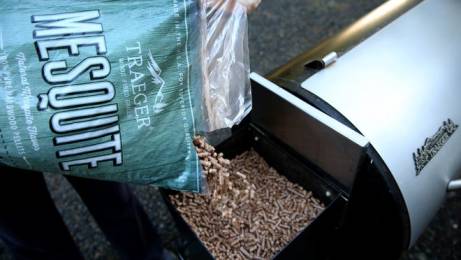
Connect with a verified veterinarian in minutes. Licensed vets are available 24/7 to answer your questions. No need to worry about your furry family member.
Do you enjoy cooking outside using a pellet grill? If so, then you may use Taeger wood pellets, which are very popular. They’re also sometimes used to add certain flavors to foods cooked on the grill.
But can Traeger pellets make your dog sick? Are Traeger pellets toxic to dogs?
In this article, we’ll take a look at what Traeger pellets are, what they’re made of, and whether or not they can make your dog sick. Let’s get started!
What are Traeger Pellets?
Traeger pellets are made to use wood-burning outdoor grills and smokers. The pellets are all-natural compressed hardwood, which can be used for smoking, roasting, baking, braising, or BBQ. Only natural hardwoods are used to make the pellets, with no unnatural additives.
The wood pellets do, however, contain food-grade soybean oil. This is used as a lubricant for the wood plants’ processing machines. Otherwise, the wood pellets contain no other ingredients.
Are Traeger Pellets Toxic to Dogs?
You’ll be happy to learn that Traeger wood pellets don’t contain ingredients that are toxic to dogs. However, the pellets can be pretty dangerous for dogs:
Allergic reaction: some dogs may experience an allergic reaction if they eat Traeger pellets. In this case, the dogs may be allergic to soybean material or the wood. Your dog may have itchy skin (localized or all over), and he may also vomit and have diarrhea, along with breathing difficulties. If your fur baby shows any of these symptoms, it’s best to call your vet immediately. Some allergic reactions can be life-threatening; however, the vet has medications to stop an allergic reaction.
Choking hazard: the pellets may also cause choking in dogs, especially smaller breeds and puppies. The pellets are shaped like small cylinders that can easily get caught in a dog’s esophagus. Trapped in the esophagus, the pellets could restrict airflow, causing a life-threatening breathing problem.
Gastrointestinal obstruction: Traeger wood pellets could also cause a blockage of the dog’s intestines, especially if he eats a large quantity of the pellets. The result could be an intestinal obstruction, which stops normal digestion and elimination.

Review symptoms, medications & behavior to keep your pets healthy with a Vet Online in just minutes.
Ask a Vet Live NowTraeger Wood Pellets & Dogs
The fact is that the pellets can make your dog sick. They don’t contain any toxic ingredients, which is great news! The problem, however, is that the pellets are made from wood. When ingested, the pellets can absorb fluid from the digestive tract, which causes the wood to swell. The danger is the pellets could cause bowel obstruction in your dog.
Symptoms of a Bowel Obstruction in Dogs
You may notice these symptoms if your dog has ingested Traeger wood pellets:
- Vomiting
- Diarrhea
- Constipation
- Abdominal swelling & pain
- Lack of appetite
- Lethargy
If you suspect your pet may have eaten Traeger wood pellets, it is recommended to contact your veterinarian immediately for individual advice for your pet. These symptoms may not occur straight away after eating the wood pellets, and seeking prompt medical attention gives your pet the best chance of a good recovery.
Be sure to let the vet know your fur baby has eaten Traegers pellets, as well as how many your dog ate. If possible, also let the vet know how long ago this happened as this will help them make the best treatment plan for your fur baby.
Treatment of Bowel Obstruction in Dogs
At the vet’s, they will perform a complete physical of your dog, which may include lab work (blood tests) and x-rays. The x-rays are done to show where the wood pellets are in the dog’s digestive system. In addition, your fur baby may require a cannula to give him IV fluids (putting them on a drip), which is used to rehydrate him, as well as make it easier to give medications that may be required.
If the wood pellets are in the dog’s stomach, the vet may be able to remove them via an endoscopic procedure. Otherwise, your canine companion may require emergency surgery.
In this type of medical emergency, the key to saving your dog’s life is to get medical help as soon as possible. Seeking prompt advice from your vet will help give your pet the best possible chance at a good recovery.
How to Keep Your Dog from Eating Traeger Pellets
There are some steps you can take to ensure your fur baby doesn’t gain access to Traeger pellets:
Proper storage: it’s essential to properly store the wood pellets in a sealed container. Place the container on a high shelf or in a locked cabinet that your dog can’t reach.
Supervision around wood pellets: another step you can take is to supervise your dog around wood pellets. In addition, ensure that all access points for the pellet grill or smoker are inaccessible to your canine companion. If you accidentally spill some pellets, clean them up immediately to keep your dog from ingesting them.
Connect with a verified veterinarian in minutes. Licensed vets are available 24/7 to answer your questions. No need to worry about your furry family member.

Evie Moloney, RCVS
This article has been reviewed and approved by an independent Veterinarian: Evie is a vet surgeon who graduated from the University College Dublin, which is the only university offering the veterinary medicine degree in Ireland. She really enjoys surgery and has also worked as an emergency and critical care vet. She is passionate about sharing education about preventative health care for pets, especially the importance of regular dog and cat teeth brushing at home. She also enjoys helping owners find practical solutions for keeping pets as comfortable as possible while living with conditions such as arthritis. When not working, she enjoys hiking and swimming.
Review symptoms, medications & behavior to keep your pets healthy with a Vet Online in just minutes.
Ask a Vet Live Now





